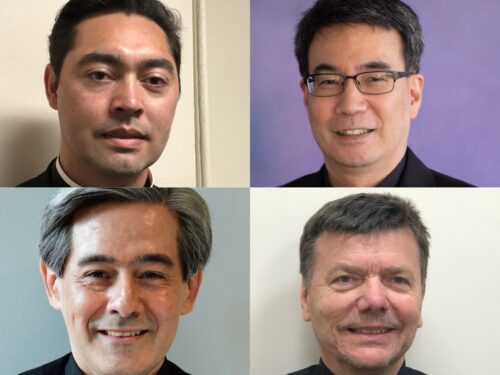
The Tablet Staff
On June 27 at 11 a.m., Bishop Nicholas DiMarzio will have laid his hands on the heads of four men
who will promise celibacy, simplicity, obedience, and prayer in service of God’s people. In so doing
they will be ordained priests for the Diocese of Brooklyn and Queens.
The Tablet has put together this special section to introduce readers to the newest priests of the
diocese. They are: Father Dragan Pusic, Father Néstor Martínez, Father Peter Okajima, and Father Gabriel Agudelo-Perdomo. May their souls burn with the power of the Holy Spirit as they guide their flock to the Promise Land.
Due to the pandemic, there will be a limited number of people able to attend in person. NET-TV, The Tablet’s sister television station, will air the ordinations live for the benefit of the faithful.
The ordinations can be viewed on Verizon Fios channel 48, Optimum channel 30, Spectrum channel 97, or free streaming at netny.tv/watchnow (just click on the blue play button).
The playlist below includes video profiles of each of the new priests. You can also view it by clicking here.
FATHER DRAGAN PUSIC
WINDSOR TERRACE — Father Dragan Pusic has managed to persevere in his vocation despite living under Communist rule for many years in his home country of Croatia and then witnessing his nation endure four grueling years of war.
Father Pusic, 54, was born in Bosnia but his family moved to Zagreb, Croatia, in 1975 when he was 10 years old. Up until 1991, when it won its independence, Croatia was part of the Socialist Federal Republic of Yugoslavia. Living under Communism was tough because individuals had very limited choices on how to live their lives, he said. “Communism and religion are not compatible,” Father Pusic told The Tablet. “My family went to church every Sunday. The government did not like you when you did that.”
The Pusic family attended Most Precious Blood Catholic Church in Zagreb. From the time he was nine until he was 14, Father Pusic was an altar server. In a twist of fate, the church where he currently serves as a transitional deacon is Most Precious Blood in Astoria.
After Croatia declared its independence in 1991 from Yugoslavia, the Croatian War of Independence raged for four years between military forces loyal to the new government and the Yugoslav People’s Army. A majority of Croatians wanted Croatia to break free from Yugoslavia and form its own independent nation. But many ethnic Serbians living in Croatia wanted their land to be part of Serbia.
The Croatian forces prevailed. More than 20,000 people were killed in the war. While Father Pusic was not directly affected by the war, signs of the conflict were all around, he said.
After he graduated from high school, he got a job in an industrial plant. “I did not like school as a kid and I did not want to go to college,” he said. He stayed at his job for 20 years, working in a lab and then managing an operations unit. “I stayed until they went bankrupt,” he said.
He soon faced “a moment of crisis.” Even though he was a regular church-goer, he found himself turning away. “I went away from the church. I sought happiness in a job and in money,” he said. He found his way back.
“After a few years, I saw that God was helping me to recognize that happiness in life is through him. It was natural that I return to church,” he said. He explained that what he meant was a spiritual return. He had never stopped attending Mass. But for a long time, his heart wasn’t in it. He joined a group of Charismatic Christians and took part in adult religious education classes, where he made a lot of friends.
Father Pusic now sees that those years led him to the priesthood. “I was looking for my place in the church. I did not plan on becoming a priest. My vocation, it just happened. I think the first call was to be a good Christian. I had a desire to be closer to God. I am grateful to God for what he did for me in my life,” he said.
Father Pusic, who came to the U.S. to live several years ago, has been preparing for the priesthood for a decade. He is completing his studies at Redemptoris Mater Seminary in Douglaston.
With the world in the midst of a pandemic, “we need more than before to be close to the church,” he said. His upcoming ordination is going to be “something amazing,” he said. But he added that he is not nervous, partly because the gathering will be small due to COVID-19. “Not too big a crowd,” he said.
Father Pusic sees his priestly role as being a helper. “People need help in growing their relationship with Christ. I want to help people get involved in church life,” he said. He invited nearly two dozen relatives and friends from Croatia to attend his ordination, but they will be unable to come. “The American Embassy closed. They were not able to get visas,” he said.
The celebration will have to wait for when he pays a visit back home. “We’ll have a big party then,” he said. Father Dragan Pusic said he is not nervous about his upcoming ordination. With New York City just starting to emerge from the coronavirus lockdown, the ceremony is likely to have a small crowd, he he said.
The big celebration will have to wait for when he pays a visit back home.
“We’ll have a big party then,” he said.
FATHER NÉSTOR MARTÍNEZ
WILLIAMSBURG — Father Néstor Martínez is currently serving as a transitional deacon at Divine Mercy Parish in Williamsburg as he eagerly awaits his ordination on June 27.
“I like it here.” He told The Tablet. “There is a strong youth ministry.”
A busy parish full of families with young children feels like Father Martínez, who comes from from a big family. “I am one of 10 children. I have four sisters and five brothers. There were 12 of us in the house, counting my mother and father,” he said.
Having nine siblings makes for a crowded house. But Father Martinez liked it that way. “It was good. You share the work,” he said.
Father Martínez, 35, has had to overcome many obstacles on his road to the priesthood, including a financial situation that dimmed his educational prospects and a language barrier that threatened to hold him back. For most of his life, he spoke no English.
He was born and raised in Colombia. His family lived on a farm outside of the city of Molagavita in the Santander Department. “I lived on a farm five miles from town,” he said.
Farm life was hard, but he didn’t mind. For one thing, the size of his family ensured that there was always enough help to handle the workload.
For another, his family was very religious and it helped him that everything in life has a larger purpose. “We prayed and said the Rosary every day. My mother said Novenas,” he recalled. The family attended Mass every at the Church of Saints Peter and Paul.
Father Martínez grew up loving to read and he did well in school, but he was not able to attend college. “There wasn’t enough money for my father to send us,” he said.
He felt the calling to be a priest at a young age. “I was 13 years old. I felt very convinced to go to the seminary,” he said. It took a few years, but he was able to achieve his goal with the help of a friend. “I talked to him many times about what I wanted and how I felt like I should be serving God. He said ‘Let me ask a priest.’ I got an interview with the priest. I was very surprised. It was so quick. It is supposed to take discernment and a lot of thought. But the priest interviewed me and said right away I could go
to the seminary,” Father Martinez said.
Father Martinez entered a seminary in Antioquia in northwest Clombia. “I studied philosophy,” he added. While Father Martinez felt for a long time that he was destined for the priesthood, he did not have an easy time of it in the seminary at first. “It was very hard. I was not accustomed to that kind of life. You have to concentrate,” he recalled.
He eventually adjusted. “After a couple of months, I realized it was the right place,” he said. He liked being around his fellow seminarians, who ranged in age from 19 to 35.
“The teachers were very good. Most were priests. There was one lay person. He was one of the best teachers. He was very devout. He prayed the Rosary every day,” Father Martinez said.’
As he moved forward with his studies, Father Martinez started to think about coming north to the U.S. Back in Colombia, he and his fellow seminarians talked a lot about the fact that many dioceses in theU.S. had shortages of priests. “We wanted to go to a place where they didn’t have enough vocations. We could be useful and serve God where we were needed. I decided I wanted to come here,” he said.
He made a couple of stops before coming to the Diocese of Brooklyn. His first stop was in the Diocese of Paterson. “I was there two and a half years. I studied English at Rutgers University in Newark,” he said. “At first, my English was not good. It was my biggest obstacle to overcome,” he said.
After two and a half years, he left the Diocese of Paterson and went to Holy Apostles College and Seminary in Cromwell, Connecticut, where he studied theology.
He then came to the Diocese of Brooklyn. He feels at home here. “I like Brooklyn. There are many cultures, many languages. It is a great opportunity to learn,” he said.
Father Martinez is looking forward to his ordination, which will take place on Saturday, June 27. He is one of four men who will be ordained that day.
How does he see his role as a priest? “I like to to do everything a little bit. To work as a missionary for Jesus is good,” he said. In his spare time, Father Martinez likes to read books. “I am reading Biblical commentaries,” he said.
Unfortunately, his family will be unable to travel from Colombia to the U.S. to attend his ordination. “They could not get visas,” he said. Any celebration will have to wait for when he pays a visit to Colombia.
FATHER PETER OKAJIMA
WINDSOR TERRACE — Father Peter Okajima found God late in life, but he believes it’s better late than never. Father Okajima, 59, who is about to be ordained in the Diocese of Brooklyn, had a roundabout route to the priesthood.
Along his journey, he grew up in a family where religion was not discussed, married and had two children, divorced, had his marriage annulled and worked in the rough and tumble world of high finance.
“I have lived a full life,” he told The Tablet. “I’m a late vocation.” Okajima recently completed his studies at the Pope St. John XXIII Seminary in Weston, Massachusetts. “It’s a wonderful institution, very special,” he said. He admitted that he was nervous as he entered the seminary. “I wondered if I could be in a rigorous academic enviroment and thrive. I am pleased to say that I can,” he said.
When he looks back at his old life, it makes him smile. “I was married with two children and had a great job that paid well. I guess you could say I was living the American Dream,” he said. Yet, he always had a feeling deep inside his heart that something was missing. He set about fi nding out what it was.
Okajima was born in Manhattan and raised in Queens. He attended P.S. 174, Russell Sage Junior High School and Forest Hills High School. He is a graduate of Dartmouth University, where he completed a double major in economics and history.
“God was not a big part of my life growing up. Religion was not something that was articulated or discussed at all,” said Father Okajima, whose mother and late father were Japanese-Americans.
His father, Robert, was a Buddhist. His mother, Kiyoka, was a Shintoist. Fearful of discrimination, the Okajimas did not practice any religion and did not encourage their children to be religious. Peter Okajima grew up questioning the existence of God.
His father, who was born and raised in Japan, served as a Japanese translator for General Douglas McArthur’s staff during the Japanese surrender aboard the battleship USS Missouri at the end of World War II. His mother, Kiyoka Okajima, was born in Japan but had spent most of her life in the U.S. She was among thousands of Japanese placed in internment camps in the U.S. during World War II.
“My parents never talked about the war to us,” Father Okajima said.
After college, Father Okajima worked in finance on Wall Street, steadily moving up the ladder. His personal life was also running smoothly. He married and he and his wife had two children.
But he started to have a nagging feeling that something was missing. He did some soul searching and heard a voice deep inside telling him to go to church. He listened to the voice.
Father Okajima went to church, met with a deacon and joined the parish’s RCIA program. A year after he first walked in the church, he received the sacraments. He became an active member of the parish
and found that his relationship with Jesus Christ had deepened.
“Then, it struck me that his call to me was not just for a personal relationship, but to the priesthood,” he said. He laughed at first. “I thought of my age, of course. And then there was the fact that I was married,” he said. Catholic priests take a vow of celibacy. “But life happens,” he said.
His wife divorced him. His children were grown. He decided to give himself over to Jesus Christ.
Still, there was the issue of his age.
In a 2019 speech at the seminary, Okajima recalled attending a lawn party there and talking with a guest who wondered aloud about the wisdom of preparing older men for the priesthood
“Surely, he said, you get more bang for the buck with younger men, men who have the potential of serving more years as a priest than someone as old as me. I replied he had a good point from a purely economic perspective. But maybe, I said, maybe God wants his church to have some priests with life experiences similar to the people sitting in the pews,” Father Okajima said in his speech.
The Pope St. John XXIII Seminary is tailored to older students. Father Okajima’s classmates included other men who, like him, had lived full lives, like doctors and lawyers, before turning to Jesus Christ.
“People there are from all over the U.S. and the world. It was a rich, diverse experience being there,” he said.
He enrolled there on the recommendation of Bishop Nicholas DiMarzio, who urged him to study for the priesthood in an environment supportive of older seminarians. “I am deeply grateful to Bishop DiMarzio,” he said.
FATHER GABRIEL AGUDELO
WINDSOR TERRACE — Father Gabriel Agudelo-Perdomo, 58, learned his first prayers and Bible stories at home. He grew in a devout Catholic family in Bolivar City, Colombia. He is the oldest of three siblings and his younger brother is a priest in the Archdiocese of Miami and his sister is a psychologist in Colombia.
His father was a wholesaler in Girardot, a city of the department of Cundinamarca, Colombia, where the family had moved while Gabriel was still a child.
After finishing high school, he felt the call to the priesthood and asked to be accepted as a novice in the Jesuits. They recommended that Gabriel take more time to consider his decision. Around that time, his plans were suddenly put on hold due to a dangerous situation he and his family were confronted with.
In the early 1980s, guerrillas started to demand protection money from local city businesses but Gabriel’s father refused to pay them. After several of his fellow businessmen were murdered for refusing to pay extortion money to the guerrillas, his father closed his business and moved the family to Bogota.
At this point, Father Gabriel decided to postpone his plans to become a priest and go to work at the Bank of the Republic’s library to support his family. His parents ended up leaving Colombia for
the United States while the siblings stayed in Colombia. His younger brother then left for Europe to continue his studies while Gabriel kept supporting the family and helping his brother.
During those 10 years working at the library, Father Gabriel says that all he did was work. There were no parties, bars, or vacation trips. He went out with a couple of girls but neither relationship turned into wedding plans. When the situation in Colombia improved, his parents and brother returned to Colombia. His brother told him: “Now it is your turn — go to college and I will pay for it.
Gabriel, already 30-years-old, quit his job but instead of going to college, he decided to pursue his old dream of becoming a priest. He finally entered the Company of Jesus as a novice and started doing
pastoral work in the poorest neighborhoods of Bogota and Medellin. Drug trafficking was at its height and there was a lot of drug-related violence in Colombia. It was during this period that he did month-long Ignatian Exercises, and it was at that moment, he says, that his priestly vocation was finally crystal clear for him.
After five years as a novice, the Jesuits told him that it would be beneficial for him to take some time off and go back into the world. Gabriel went to college to study International Finances. He had a girlfriend in college but his focus was on his studies and he graduated as the valedictorian of his class.
After working for a brief time as a financial consultant, Gabriel decided to become a monk and entered a Benedictine monastery. Two years later, he joined the Children of the Divine Father, a contemplative order founded in Colombia.
After five years of contemplative life in the monastery, he decided to return to the seminary to become a priest. He was accepted in the Christ the Priest Seminary in La Ceja, near Medellin. By the time he
was working on his theology studies, his brother was already a priest in the Archdiocese of Miami.
He wanted to come to Miami and be near his brother but that dream never materialized. At the end of his second year of Theology studies, he found himself without a diocese to sponsor him, so in 2015, he spent a year doing pastoral work on his own.
At that time, his brother was sent to work for six months at St. Patrick’s Cathedral in the Archdiocese of New York. During a conversation with Cardinal Dolan, his brother explained to him that Gabriel wanted to finish his studies, become a priest, and come to the United States. Cardinal Dolan asked Gabriel to send him a curriculum vitae and autobiography. The cardinal gave the documents to Msgr. Thomas Bohlin, U.S. vicar of Opus Dei, who gave them to Bishop Nicholas DiMarzio. After a long process that included interviews with family members and professors in Colombia, in November 2015 Gabriel was accepted as a seminarian of the Diocese of Brooklyn. He went back to the seminary and finished his final two years of theology in Colombia.
In January of 2018, he arrived in Brooklyn and started studying English and doing pastoral work in preparation to serve in the diocese. Like the people of Israel in the desert, it took him almost 40 years to to reach his goal. His English is still shaky, but he feels ready to serve as a priest, especially among the Latino community.

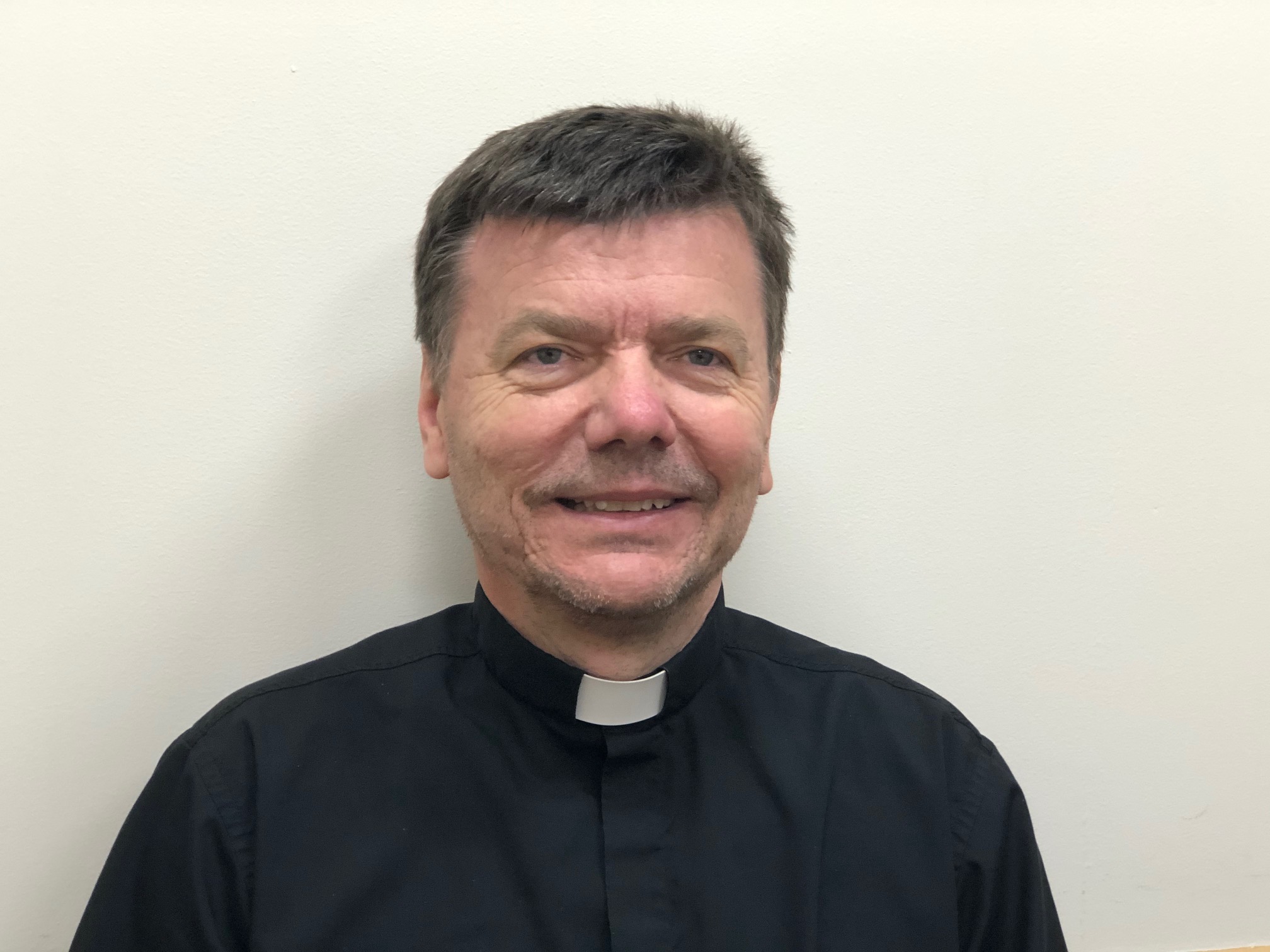
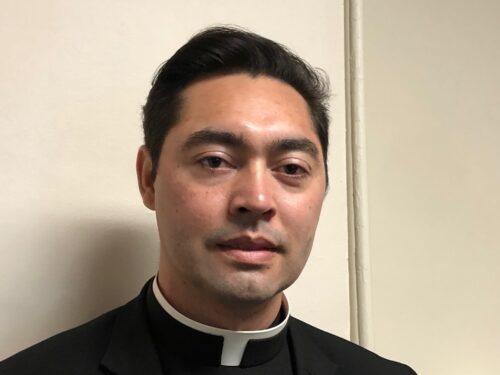
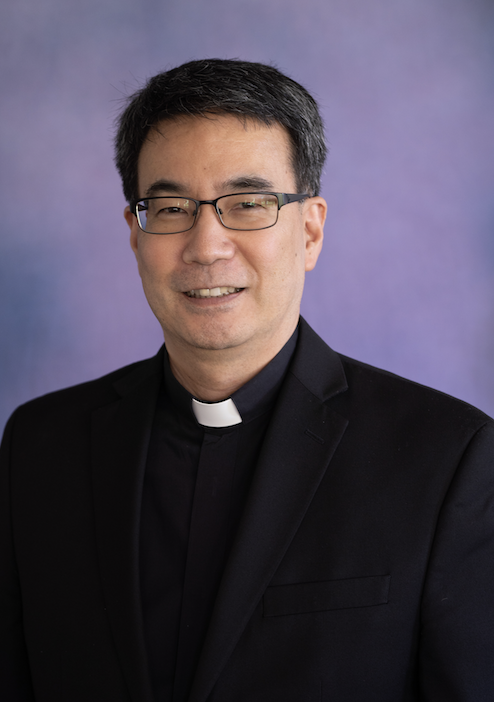
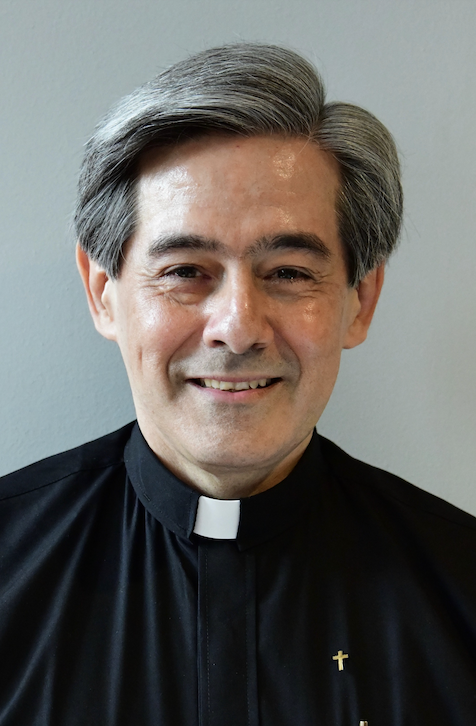
Wow! How the priesthood in the Diocese of Brooklyn has changed. When about 40 of us were ordained in 1959, a “late vocation” would have been someone 27 years old. Almost all of us were 25. I was still 24. Most were of Irish, German, or Italian descent. I wish these men well.
may god bless them in there vocations and may continue to be blessed in there chosen ministry.